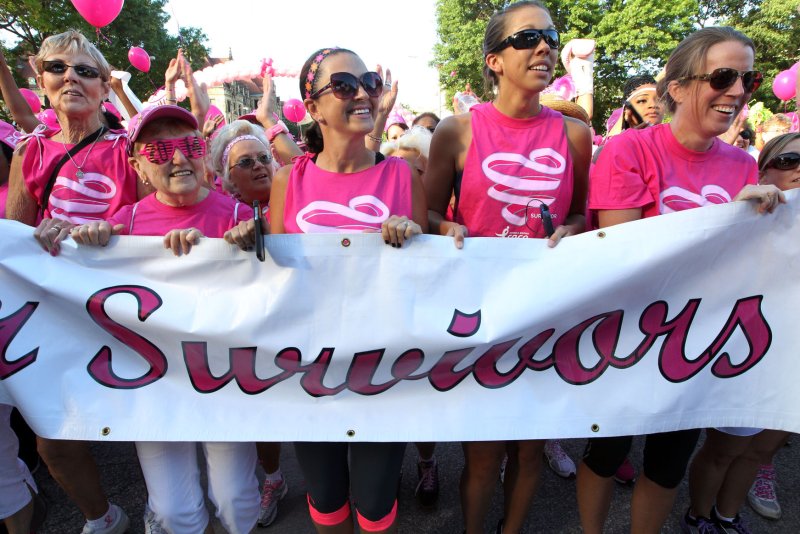Breast cancer survivors march up to the stage during a special ceremony before the start of the annual Koman Race for the Cure in St. Louis on June 14, 2014. UPI/Bill Greenblatt |
License Photo
CAMBRIDGE, England, Aug. 7 (UPI) -- Women carrying a rare mutation in the gene known as PALB2 had a 35 percent chance of developing breast cancer by the time they turned 70 -- that according to a new study lead by researchers at Cambridge University.
The study compiled the results of health surveys from eight countries, analyzing genetic data and rates of breast cancer from 154 families without BRCA1 or BRCA2 mutations, including 362 family members with PALB2 gene mutations.
Researchers have long known of the strong link between BRCA mutations and breast cancer -- mutations that carry a 45 to 65 percent risk of developing breast cancer. But the correlation between cancer and PALB2 is newly established. And the risks associated with PALB2 go up if a woman has a history of breast cancer in her family.
"Since the BRCA1 and BRCA2 mutations were discovered in the mid-90s, no other genes of similar importance have been found and the consensus in the scientific community [is] if more exist we would have found them by now," explained Dr. Marc Tischkowitz, researcher in Cambridge's Department of Medical Genetics.
"PALB2 is a potential candidate to be 'BRCA3,'" add Tischkowitz. "As mutations in this gene are uncommon, obtaining accurate risk figures is only possible through large international collaborations like this."
The new study into PALB2's role in breast cancer development was published in the latest issue of the New England Journal of Medicine.
Only about one in every 1,000 women carries the PALB2.
"It's not common, but the risks are significant," co-author William Foulkes told HealthDay. Foulkes is the director of the Program in Cancer Genetics at McGill University's Center for Translational Research in Cancer, which is located in Montreal, Quebec.
"Particularly for a woman with a strong family history of breast cancer, they may want to find out if they have this mutation," Foulkes added.
Researchers say all three of these mutations interact with each other to inhibit the body to repair broken DNA, thus increasing the chance of malignant growths. They also say most tests already look for the PALB2 mutation. Only now, researchers are realizing its significance.
The mutation's presence, researchers say, should change the way a patient talks with their doctor about screenings and even preventative procedures like a mastectomy.















